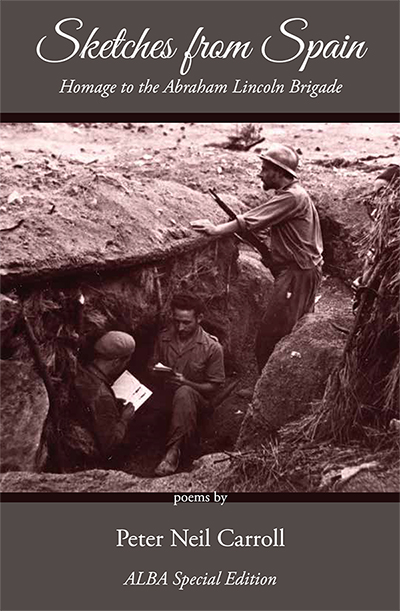Peter Neil Carroll. Sketches from Spain: Homage to the Abraham Lincoln Brigade. ALBA Special Edition. Charlotte, NC: Main Street Rag Publishing Company, 2024.
Scholar and poet Peter Carroll may be best known for his historical works on the Spanish Civil War and the 2,800 Americans who served in it. Building on The Odyssey of the Abraham Lincoln Brigade: Americans in the Spanish Civil War (1994) and From Guernica to Human Rights: Essays on the Spanish Civil War (2015), this new collection of poems is a tribute to those volunteers known as Lincolns. Longshoremen, sailors, teachers, students, novelists, poets, nurses, doctors, barbers, carpenters, florists, truck drivers, plummers, salesmen, tailors, artists, cabbies, musicians, and factory workers of all types joined the International Brigades to stop fascism from spreading in Europe. Men and women alike, Jews, African Americans, Asian Americans from virtually all fifty states united in a common cause to liberate the democratically elected Republic of Spain from a fascist uprising led by General Francisco Franco and the neighboring dictators who propped him up—Hitler and Mussolini. Through a lyrical collage of archival sources and blank verse, Carroll has assembled a poignant testimonial of those Americans he knew who enlisted in the Abraham Lincoln and Washington battalions of the International Brigades, more commonly referred to as the Lincoln Brigade after the war.
The Lincolns or brigadistas were united by the choice they made to risk it all crossing the Atlantic for an uncertain fate. The deceased, the survivors, and even the deserters get equal page space in Carroll’s kaleidoscope homage. But not all are typical heroes in these non-fiction poems. The first is dedicated to the fragmented unknown soldier:
Does it matter who he is
or why he’s smiling, what he read?
he was there,
Spain 1937
in ill-fitting trousers and shirt,
fighting fascists,
anonymous, immortal.
Other poems are dedicated to those who became known for their personal uniqueness, or the unique path they took to get to Spain. Many of these volunteers were first-generation children of immigrants from big cities, and small towns. One Lincoln was the son of an Ohio governor while another actually ran for governor of California in 1946. Among the better known is the charismatic Berkeley graduate student Robert Merriman—son of a lumberjack—and his wife Marion, who arrived from California via a research fellowship in Moscow. Novelist, journalist, and screenwriter Alvah Bessie was one of the “Hollywood 10” and appeared before the House Un-American Activities Committee in 1947 where he refused to talk, and became “a minor star mingling with the left elite.” Another who rubbed shoulders with Ernest Hemingway—one of the most renowned chroniclers of the war—was a working class Jew from Brooklyn named Milton Wolff, who began as a machine gunner and was quickly promoted to battalion commander before returning home with the rest of the international volunteers in December 1938.
The war in Spain brought dignity to those discriminated against at home because of the color of their skin, such as Crawford Morgan:
In Spain I felt like a human being, a man.
People didn’t look at me with hatred in
their eyes because I was black, it is quite
a nice feeling to feel like a human being.
Or Salaria Kea:
She stood out, the one African American
woman in the Spanish Civil War, a nurse who
spoke her mind, fought racism, saved lives.
Carroll’s poems, rarely more than a page, are structured around both known and little known facts which defined these volunteers, many whom Carroll was able to interview himself when they were alive. Nearly all joined the Communist party—a prerequisite of the Comintern’s recruitment and a decision which would follow the survivors back to the United States. Many Lincolns were persecuted, blacklisted, imprisoned, or driven to suicide or exile by their own government during the McCarthy era. Carroll’s verses locate the humanity in those volunteers who had broken and turned against the cause. Edward Barsky, on the other hand, was among so many like Bessie and others who paid a high price for refusing to name names:
[…] He went to prison—
six months and a fine. Now a felon, he
lost his New York medical license but
what else could a good doctor do?
Whether they died in Spain, in the next World War, or in the U.S. most dedicated their lives to the struggle, taking up similar causes along the way. Carroll’s poems document how they found meaning and relevance in new fights against totalitarianism, racism, and anti-semitism in the 20th century. While many re-enlisted and served proudly in World War II, others protested American wars in Korea, Vietnam, and Iraq as well as American covert operations in Cuba, Chile, and Central America.
Peter Carroll’s Sketches from Spain: Homage to the Abraham Lincoln Brigade is an accessible testament and representation of extraordinarily moving individuals who put their lives on the line to change the world. They recognized the high stakes at play in Spain, which so many Americans realized too late, as World War II would come to prove.
Claude Potts is the Librarian for Romance Language Collections at the University of California, Berkeley where he is also part of a cross-departmental team working to install on the campus a plaque honoring Spanish Civil War volunteer Robert H. Merriman. This review also appeared in H-Spain.
